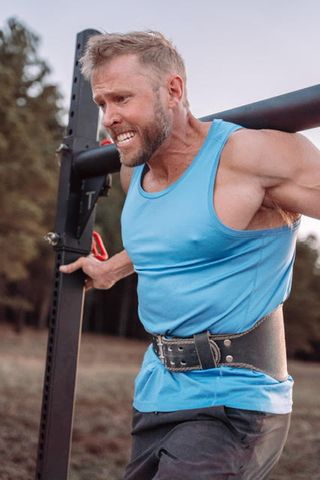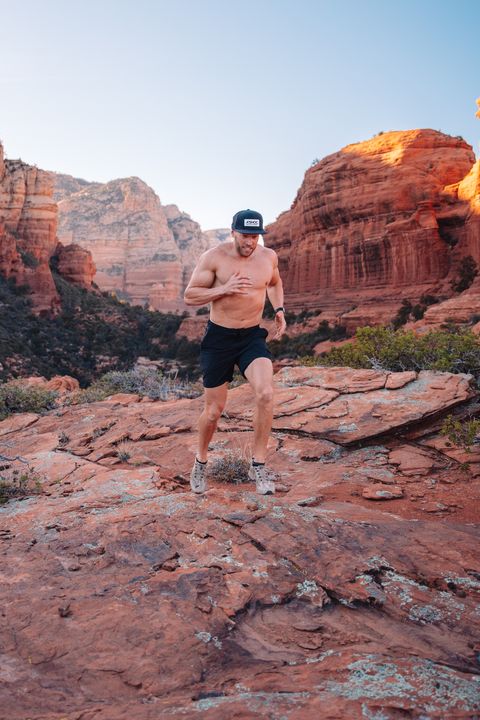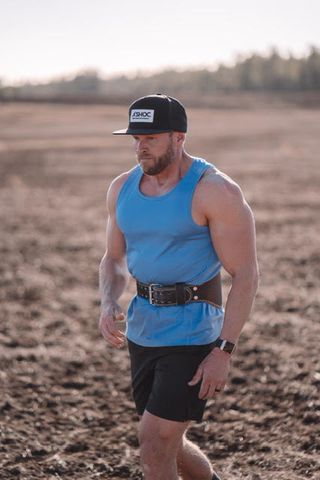[ad_1]
Ryan Hall retired from professional running five years ago, but he never slowed down: The 39-year old, who was the first American to break one hour in the half marathon, has devoted his post-career days to getting massive. And he’s traded in breaking the tape on marathons to undertaking huge solo challenges—like carrying 140 pounds of water to the top of Mount Crested Butte, or combining farmer’s carries, lunges, and other moves into the “World’s Most Interesting 5K.”
“At this stage of my life, I just want to do these fun, random challenges that I’m totally making up,” he says. “And then I capture it and share it with other people. If they like it, cool. If not, I was doing something I wanted to do anyways.”
For his next trick, Hall will release a video of himself doing a 500-pound yoke carry for five hours across a dry lake bed.
“It actually destroyed me more than all my other challenges combined,” he says. Due to the soft footing of the lakebed, “my goal was to go 5,000 meters with 500 pounds on my back. I only made it like 2.05 kilometers or something like that.”
But Hall isn’t just creating his own masochistic fitness challenges. For the past six years, Hall has been coaching his wife and fellow runner, Sara—during that time, she has set the American record in the half-marathon, and run the second-fastest marathon time in history by an American woman. He also coaches other athletes through his company, Run Free.
After a morning workout with some of his coaching clients in Flagstaff, Arizona, Hall spoke with MensHealth.com about heavy deadlift days, gave tips to help readers run their own fastest times, and why he crushes candy between sets on leg day.
This interview has been condensed and edited for clarity.
Many of your recent challenges, like your 500-pound deadlift and five-minute mile challenge, involve deadlifting some big numbers. What’s your deadlift day like?
I have a cycle that’s been working for me: I take three easy days between sessions. So I’ll do three upper body days, and then just do all lower body [in one workout]. And usually I lead with the deadlift, especially if I’m trying to get that up. I’ve found whatever I do first, I’m going to get the most benefit from.
I have to train pretty untraditional. I wish I could just go into a gym and do five by five. But I’ve tried that and it’s not enough stimulus for me. Like I take my body has to really get nailed, you know? So for me, my personal sweet spot is I do like 10 sets of deadlift, and I go pretty heavy, doing one rep, two reps [per set]. And then I kind of lighten it as the 10 sets are going on a little bit, but I keep it pretty heavy the whole time. And then just do supportive stuff after that. I also do, I call them Eddie deadlifts, where you just pull from the floor to your knee and back down.
After that, I do weighted back extension. I have a leg press machine in my garage, so I hit that as well. You know, Eddie Hall talks about the deadlift being being a leg press, and I’m still trying to develop that myself. I also squat that day as well.
I feel like I have to really pound myself super, super hard or else I just stop growing. And also during that [bulking] phase, the nutrition piece is just huge. If I’m not getting in an excess of calories, I’m not seeing growth. So the nutrition piece is huge. And then, I have to run like zero, ideally. That’s when I see my best strength gains in the gym, when I’m not running or doing any cardio at all, just lifting super heavy, eating, sleeping.
It’s kind of hard, honestly, cause I like going out for little 30 minute easy runs. But even with that three times a week, for me, my body just will get rid of muscle. Or it’ll be really hard to add muscle even if I’m eating a ton of calories. So I definitely have the marathon runner genetics, the hard gainer genetics, and I have to kind of fight through that with some kind of intuitive, outside of the box training that I found has worked for me.
Speaking of recovery and getting calories down, do you have a go-to protein shake for after a big training day? What’s the recipe?
When I’m bulking, I’ll make a shake with like MuscleTech whey protein post-workout. I might throw like some green shake, like Athletic Greens, in there just to get some more nutritional value. I’ll also be putting in some maltodextrin, which is just a flavorless carb. It’s a complex carb, but there’s like no nutrients in it besides just carb calories. So I like to try to like find little ways to try to put some healthier stuff in my shake to get my body some nutrition. Because honestly, I feel like when I’m bulking, I’m eating pretty simple foods, white rice, lots of quesadillas, hamburgers. It’s kind of like a kid’s dream diet, but I have to drink a ton of calories, because I’m just I’m full all the time. That’s, certainly for me, the hardest part about getting bigger and stronger, and it gets really mentally draining after a couple of months. You’re looking at your body and you’re feeling kind of sore and you feel stuffed all the time. You’re forcing all this food down. But then I walk in the weight room and I’m feeling like a beast.
I’m also eating a lot of candy during my workouts. So I’ll get a fat-free candy. A lot of this stuff that we take in marathons is just simple carbs. And so if you’re taking a simple carb, take one that you enjoy. And I’ll just have like a pile of it out in my gym when I’m working out and in between every set, go grab a couple pieces of candy. Eat it the whole time. I’m just like taking in simple sugars, but that is kind of like the only time I allowed myself to eat a bunch of junk.
As you were transitioning from marathon Ryan to swole Ryan, what was the best piece of advice you got from a fellow pro or a coach?
I remember, early on, watching a whole bunch of bodybuilders and how they train. I remember seeing Jay Cutler saying, “I am hungry never. I crave nothing. Like I’m just full all the time. Like, I don’t like the eating.” And that was actually super helpful for me to realize that there is a cost for all this muscle that you won’t put on a bunch of muscle without that cost. And a huge part of that cost is calories like just eating enough food. And that’s the number one.
The general principle is that if I’m trying to get bigger and stronger, I just have to be full all the time, and then force myself to eat. It’s not fun. I don’t enjoy the nutrition aspect of it in terms of not being hungry and not really enjoying food as much. But it’s essential for my goal, so I just kind of have to force it down, you know?
When you’re training Sara or other athletes or you’re on the road and things get busy, do you have a go-to workout when you’re short on time?
A lot of the challenges I’m training for, it’s just from 20 minutes every other day. So something I’ve been incorporating is what I call fitness walks. Basically, I have a list on my whiteboard in my gym of things that I like to do outside. And I pick one thing off the list. I start my watch for 20 minutes and I’m just moving that whole time. So if I’m using the yoke, I move it, set it down, walk for 30 seconds, catch my breath, go again. And I’ll do that for 20 minutes straight. Same thing, I’ll do it with farmer’s carries. I’ll do it with walking lunges. I’ll do double leg bounds that way. Sometimes I’ll do a little bit of everything I do, like 20 minutes of jump roping or mixing it in with other apparatuses. It could be like hitting my punching bag in my garage for 20 minutes.
And the reason why 20 minutes is because it’s easy to commit to 20 minutes. I can always make in 20 minutes between doing stuff with the kids and making dinner or whatever I’m doing. Whereas if I’m like, “Okay, I need to go carry this yoke for another hour after an hour gym session,” it’s like, this is getting a little bit excessive for like a hobby-level athlete.
Let’s get some advice for the runners out there. What’s the most common mistake you see average runners making during their road races? And how can they fix it?
The most common one is going out too fast. It’s a boring answer, but people just get excited by the crowd. They’re tapered. They’re carb loaded. You’re feeling good. And it’s super easy to get sucked out too hard.
And this happens not just for common runners, this happens with pros. I’ve done this as a pro athlete myself. So what I do now as a coach is I have my athletes really watch their splits. Even in the first 400 meters of the race, it’s so easy to get sucked out too fast. So I’ll tell my athletes, I want you to check your watch like 12 times in the first mile, and make sure you’re not running too fast. Even when Sara, when she was going for the American record in the marathon, I wanted a mark at 200 meters and 400 meters so that her pacers could be checking their splits early on, because you can burn through a ton of glucose early on, which is super important for longer distance races or put a bunch of junk in your legs in that first 400 meters where you’d be better off to just start the race all over again.
How should guys recover after their big race day?
So people aren’t going to like this advice, but it’s honestly the best advice I could give: So I just had an athlete run the Boston Marathon this last Monday. And the next day, I said, “All right, get up, you’re going to go for a 30-minute easy run.” And that’s like the last thing you feel like feeling doing. Even when you watch people just walking around the airport after a marathon, they’re all limping around looking like they just got out of the hospital.
Blood flow is the number one thing with recovery, so you want to promote blood flow. So it’s not intuitively what you feel like doing, but it’s super, super important. And I actually didn’t do this during my career. So this is something where I made a big mistake in my career by not doing this, but I learned from that now. I have my athletes do a 30-minute run the day after their big race, another 30-minute run the next day. And then like, if they’re going to take a full break, we’ll take that full break after that.
Even if you’re really hobbling and you can’t go for a 30-minute easy run, hop on a spin bike, go for a little 30 minute bike or take a hike.
You’ll be 40 soon. For the guys out there in your age range, what’s something they should be paying more attention to as they get into their late 30s, 40s, and beyond?
I think paying attention to your hormonal health. It becomes increasingly important for guys in our age category. I’m routinely getting bloodwork done, making sure my testosterone is staying in healthy levels. Just checking in on that stuff and seeing where it’s at, because that makes such a huge difference in terms of motivation, drive, feeling good about life, general wellness. And testosterone is one of those numbers that can can start to slide on you if you’re not paying attention. And that’s directly correlated to how many hours of sleep you’re getting, how much healthy fat you’re getting in your diet, or even if you’re overtraining. All these things factor into healthy testosterone levels. Guys, really pay attention to that. Because I know it can be super frustrating to be putting in all the time in the gym and not seeing any results. And oftentimes that just comes back to little things like your hormonal health, nutrition, and sleep. So I think as we get older, we have to pay more and more attention to the variables outside of the weight room because those are going to be more affecting the kind of gains are able to see in the weight room.
What’s something those same guys should be paying less attention to?
It’s funny coming from a former pro marathoner, but I think cardio. When you look into like longevity and things like that, they talk a lot about needing to get into weight training and how that is the healthy way to age, trying to hold on to muscle mass. And honestly, doing a bunch of like low-intensity cardio work is just kind of like burning off your muscle and not really helping you a whole lot.
Like a few years ago I went like seven months without running once. Not a step. And all I did, like I was in the weight room, early on, I’m lifting big weight and the rest periods are big. But then as the weight gets lighter, the rest gets lighter or shorter. So I’ll be taking like 45 seconds rest, and I get enough cardio benefit just from taking short rest on the weights. So I think that would be a much better thing for guys in our age range. Forget about jogging 30 minutes super slow on a treadmill at the end of your workout. Just tighten up the rest and you’ll get that cardio benefit while you’re strength training. And you won’t be burning through your muscle, burning it off by doing this slow, no-point cardio.
You made this huge transition from fast guy to swole guy. If readers are looking to start their own new adventure and they want to excel, what tips do you have that could help them pick a new goal?
I think it’s really fun to do both something you’re good at, and something you’re not. That’s kind of what I’m doing, right? I’m taking one thing I’m not naturally good at, strength training, and I’m combining it with something I am really good at, but I don’t necessarily want to do a lot of anymore, which is endurance training. So the fun thing about doing things are not good at is that it’s super easy to improve. Like the first time I picked up the yoke with 300 pounds on it, I felt like it was crushing me. I was so bad at it. Then, like three months later, I was working with 500 pounds, feeling fairly comfortable. So that’s that’s the fun thing about doing something you’re not good at. It’s really easy to improve, whereas if once you get really seasoned and really good at something, it gets pretty tough to even make the tiniest of gains.
So I think first people can combine something that’s a strength of yours with a weakness of yours, and I think you’ll really enjoy seeing the benefit of seeing your weakness get better. And then it’s always fun when you go back to your strength, because things just click when you’re working within your strength.
And finally, find things that you love to do. Like, I like being outside. I like moving heavy objects. Like I have a bunch of rocks in my front yard. I just go pick up rocks and just carry them around. I’m not afraid to just try kind of weird stuff if someone’s watching me from the outside. You’ve got know yourself, and you’ve got to know that you’re going to enjoy your training. If you’re not having fun with your training, what’s the point?
This content is created and maintained by a third party, and imported onto this page to help users provide their email addresses. You may be able to find more information about this and similar content at piano.io
[ad_2]
Source link



